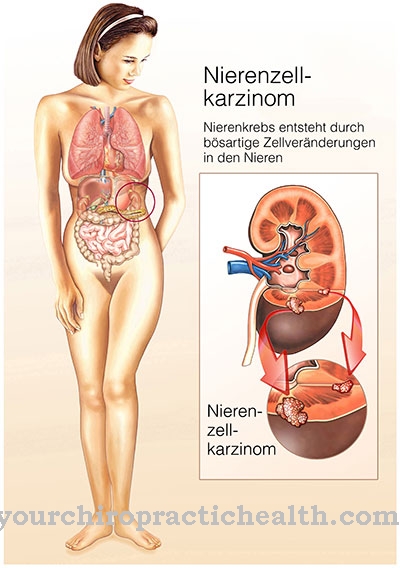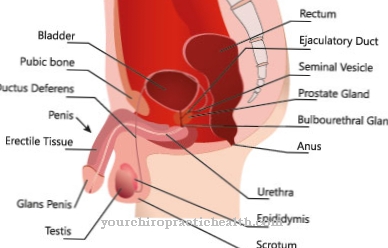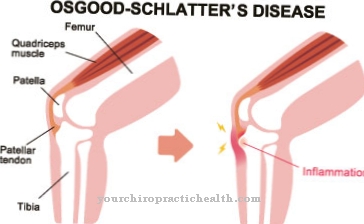A somatoform disorder represents a complex of symptoms which cannot or cannot be explained adequately by organic causes. These are functional complaints that are related to psychological stress and stress on the patient. Somatoform disorders are very common and in most cases are temporary.
What is a somatoform disorder?

© Goffkein - stock.adobe.com
At a somatoform disorder it concerns physically perceived complaints for which no organic causes can be found. All organs can be affected by functional disorders caused by a dysregulation of the autonomic nervous system. If no organic changes are found after an extensive examination of the patient, the diagnosis "somatotropic disorder" must be made.
Most people (over 80 percent) suffer from somatotropic disorders at least temporarily during their lifetime. This state usually only lasts for a short time and is usually associated with extraordinary life situations. In 5 to 20 percent of all cases, however, the symptoms become chronic.
Symptoms such as exhaustion, tiredness, gastrointestinal problems, cardiovascular problems or sexual problems are often observed. In order to make a diagnosis, however, it is necessary that all other possible causes of the symptoms are excluded in order to be able to offer the patient psychotherapeutic treatment.
causes
The causes of somatoform disorders are diverse. They result from the life situation of the patient concerned. The interplay of psychological, social and biological factors is assumed to be the trigger. There can also be a genetic basis. Mostly it is a question of psychosocial reasons that lead to characteristic complaints.
One cause can be long-term negative stress, which causes long-term functional disorders of certain organs. Paying too much attention to harmless symptoms, paired with the fear that it could be something worse, often leads to considerable complaints without any organic causes being recognizable. Mental processes and conflicts associated with the emotions anger, anger, fear or dissatisfaction often manifest as physical symptoms. Early childhood traumatic experiences often also play a role.
Symptoms, ailments & signs
The somatoform disorders manifest themselves in many different symptoms. Difficulty breathing, globus feeling or shortness of breath often occur. There may be feelings of tightness, stitches, pressure or racing heart in the chest.Furthermore, many patients suffer from digestive problems such as nausea, stomach pain, upper abdominal pain, bloating, gas, diarrhea or constipation.
Women can also experience gynecological problems. Frequent urination and pain disorders are also observed. Overall, somatoform disorders are divided into somatization disorders, hypochondriac disorders and somatoform autonomic dysfunction. Somatization disorders involve many changing physical symptoms that have existed for at least two years and cannot be explained by organic causes.
This includes pain, digestive problems, neurological symptoms, and sexual disorders. The clinical picture of hypochondria is characterized by the fact that the person concerned is convinced that they are suffering from a serious illness and cannot be convinced otherwise. The affected patients observe themselves continuously and greatly enhance harmless symptoms.
If no physical causes are found, the doctor will be changed. Somatotropic autonomic dysfunctions are symptoms in organs that are supplied directly by the autonomic nervous system. Heart neuroses, stomach problems, hyperventilation, frequent urination or irritable bowel syndrome are often observed here. Here, too, organic causes cannot be found.
Diagnosis & course of disease
To diagnose a somatoform disorder, it is very important to unequivocally rule out an organic cause for the symptoms. In addition to the usual laboratory tests, this also includes imaging procedures. On the other hand, too intensive a diagnosis would be fatal if a somatoform disorder is suspected.
The patient would concentrate even more on finding an organic cause and close himself out even more to psychotherapeutic work-up of his problems. Of course, the diagnosis must also be differentiated from other mental illnesses such as depression.
However, when making a diagnosis, it should also be noted that the somatoform disorder is often associated with such mental disorders as addictions, anxiety disorders, depression, obsessive-compulsive disorder, and personality disorders. An important criterion for a somatoform autonomic disorder is the existence of at least six symptoms from two organ groups that are not organic and have existed for at least two years.
Complications
In the case of somatoform autonomic dysfunction, the major challenge for the doctor and for the patient is to differentiate between the psychosomatic and physical causes of the symptoms. Difficulties arise not only during the initial diagnosis. Various complications are possible if an additional physical illness is not recognized in time. In addition, it is conceivable that an actual worsening of an existing physical dysfunction is incorrectly interpreted as psychosomatic.
Some people with somatoform autonomic dysfunction experience discomfort related to a specific organ. An example of this is cardiac neurosis. A patient with a heart neurosis can develop not only real heart problems, but also develop another organ disease. Conversely, a person who suffers from physical heart problems may additionally struggle with a somatoform autonomic dysfunction related to the heart or other vegetative functions.
Thorough examinations are therefore required to rule out physical complications. For the treatment of the somatoform autonomic dysfunction, however, this means a dilemma: the medical examinations can (and must) rule out physical causes for the symptoms - but at the same time these examinations can increase the psychological feeling of illness.
It is also possible that medical examinations and treatments cause direct damage or that the physically healthy patient becomes infected with a pathogen through other patients. Possible complications of somatoform autonomic dysfunction also include psychological complaints such as depression and anxiety.
When should you go to the doctor?
With this disease, the patient needs treatment. This can lead to serious complaints and complications, which in the worst case can also reduce the life expectancy of the person affected. A doctor should be consulted to prevent further discomfort. This disorder only heals itself in very rare cases. A doctor should be consulted if the person has severe digestive problems. There is considerable pain in the stomach or severe nausea.
Severe pain in the upper abdomen or a permanent feeling of fullness can also indicate the disease and must be examined by a doctor. In many cases, constipation also occurs. Furthermore, psychological moods or other psychological complaints can point to the illness.
In the case of this disease, a general practitioner or an internist can primarily be seen. Further treatment, however, depends heavily on the exact causes and the exact form of the disorder. As a rule, the disease does not reduce the life expectancy of the person affected.
Therapy & Treatment
Treatment of a somatoform disorder is often very difficult. The prerequisite is the development of a relationship of trust between patient and doctor. However, this is often not the case because the patient is primarily looking for an organic cause for his symptoms. This leads to constant changes of doctor in the hope that the diagnosis sometimes made by the patient himself will be confirmed at some point.
However, the doctor must be able to plausibly explain the disease to the patient in order to be able to follow up on successful psychotherapy. The patient must be motivated to work on their problems based on this knowledge.
You can find your medication here
➔ Medicines to calm down and strengthen nervesprevention
Prevention of a generalized and chronic form of somatoform disorder begins in early childhood. In this way, behavioral structures are learned from the parents and adopted for coping with their own problems in later life. You can also learn how to deal with physical symptoms that always occur.
If physical complaints provoke other people's attention that would otherwise not take place, the adolescent learns a wrong coping strategy for his life problems. Therefore, a positive and life-oriented upbringing can do a lot to improve human health.
Aftercare
Somatoform disorders affect different areas of the body, such as the female abdomen or the cardiovascular system. The type of follow-up that is appropriate for a somatoform disorder therefore depends on the patient's symptoms. The individual constitution of the person affected must also be taken into account when considering appropriate aftercare.
Follow-up care is recommended in any case in order to bring the physical and mental health back into harmony. As part of the aftercare, the sick person must become aware of the (both positive and negative) interaction between physical and mental. In addition, the prevention of a relapse and the long-term stabilization of the person affected are goals of follow-up treatment.
This is especially true if the patient has previously been treated in a clinic for somatoform diseases and is to return to his familiar surroundings. It makes sense to give the person concerned the address of a local family doctor or psychologist. The patient can turn to this contact point if there is an acute crisis situation after the treatment has been completed and an intervention is required. The person concerned should be urged to visit a specialist in an emergency, as the risk of deterioration or relapse in such a situation is very high.
You can do that yourself
If, despite numerous examinations, existing health impairments cannot be clarified, the person affected should remain calm. If it is proven that there is no organic disorder, emotional factors must be given greater consideration. Further changes of doctor are often not recommended.
An unhappy lifestyle, a reduced well-being or unfulfilled wishes of various kinds can lead to health disorders. If goals in life have not been achieved or if your own life does not develop according to plans or guidelines, this should be examined in more detail. Depending on the personality, these topics can be questioned critically and changed.
However, it is advisable to seek therapeutic help. It has proven useful for a large number of those affected if a neutral person can provide additional impetus for working through cognitive patterns. Everyday stressors should generally be reduced. In addition, the everyday processes must be optimized and adapted to the requirements of the organism.
In many cases, improvements can be made with a healthy and balanced diet. In addition, social contacts should be established and maintained. Adequate leisure activities are also important so that an appropriate balance to everyday life can be achieved. Cognitive training and relaxation techniques have proven effective for many sufferers. They help to alleviate existing complaints and promote well-being.




.jpg)
.jpg)







.jpg)

.jpg)
.jpg)











.jpg)